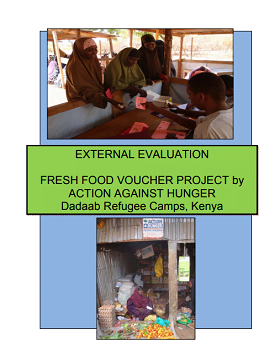External Evaluation: Fresh Food Voucher Project by Action Against Hunger in Dadaab Refugee Camps, Kenya
The town of Dadaab in North Eastern Kenya is home to three refugee camps: Hagadera, Dagahaley and Ifo hosting over 240,000 people. The camps were established in mid-1992 after the closure of the Liboi camp, which was too close to the Kenya/Somali border to ensure adequate security. Continued insecurity in Somalia means there are still regular influxes of people into the camps, with the population increasing at an average rate of 5,000 per month during 2008.
The three camps are managed by the United Nations High Commission for Refugees (UNHCR) and food is provided by the World Food Programme (WFP) as a dry ration. Currently, the ration is provided to all residents but does not include fresh foods such as vegetables or fruit and many residents have little access to food beyond that which is provided. Each of the camps has a market where resident vendors sell a variety of items including fresh foods. However, since residents are prohibited from employment, their ability to obtain these foods is closely related to the limited level of external support they get from remittances or through the sale of part of the general food ration.
Many refugee households lack the resources for self-reliance and indications from UN Joint Assessment Missions and surveys carried out regularly by NGOs confirm that refugee households are highly dependent upon humanitarian aid for their survival (JAM, 2006). Even if households were able to work or raise livestock, the harsh semi-arid environment around the camps is not conducive to any meaningful coping mechanisms that could constitute a source of income.
In order to increase the consumption of nutritious fresh foods by the refugee population, a voucher program was implemented by Action Against Hunger (ACF) with funding of 1,000,000€ from the French Government. The project started in September 2007 and will be completed in April 2009. This project was evaluated by an independent consultant in February 2009. The methodology included a review of available literature and secondary documentation, field visits and key informant interviews with relevant stakeholders.



